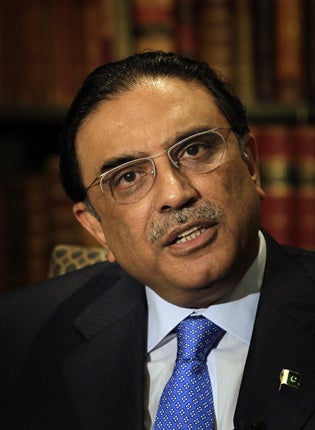Asif Ali Zardari returns to Pakistan amid memo saga

Pakistani President Asif Ali Zardari returned home from medical treatment in Dubai to face rising tension between his civilian government and the military over a memo accusing the country's generals of plotting a coup.
It's not clear when the deeply unpopular leader who has uneasy ties with the army will return to work. He flew into the southern city of Karachi after treatment for a heart condition.
"The president is thankfully fit and healthy and that is why he has returned," Shazia Marri, information minister for Sindh province, of which Karachi is the capital, told Reuters.
State television showed him at his residence, looking relaxed as he met senior provincial officials.
Zardari could be damaged by the memo, reportedly crafted by his former ambassador to the United States, which wants ally Pakistan stable so it can help wind the war down in neighbouring Afghanistan.
The Supreme Court today started hearings into a petition demanding an inquiry into who was behind it. As president, Zardari is immune from prosecution but the controversy could seriously damage him politically.
If a link is proven, the military, which has long been distrustful of Zardari, could push for his ouster.
Although Zardari's position is largely ceremonial, he wields considerable influence as leader of the ruling party and his forced departure would be a humiliation for the civilian leadership and could throw the country into turmoil.
Ruling Pakistan People's Party officials played down concern the military could move against Zardari.
"The government and the military are on the same page. There is no conflict, and there is no chance of any rift between state institutions," said a PPP leader who requested anonymity.
"We don't want any conflict and won't do anything which leads to that."
But the military is taking the memo seriously.
Army chief General Ashfaq Kayani called for an investigation, saying the memo was an attempt to hurt national security.
Tension between the civilian government and military has bedevilled the nuclear-armed South Asian country for almost its entire existence. The military has ruled the country for more than half of its 64-year history after a series of coups.
No evidence has emerged that the army was plotting a coup and the Pentagon at the time dismissed the memo as not credible but the issue is seen as further weakening a government already beset by allegations of corruption and incompetence.
The army is viewed as Pakistan's most effective institution.
"If it wasn't for the army, our rulers would have run away with all the money they got through corruption," said Tasleem Bokhari, 27, a small businessman.
The military, which determines security and foreign policy, dismisses any suggestion that it might stage a coup but analysts say intervention could not be ruled out in the event of chaos.
Zardari was elected in 2008 on the back of a sympathy vote after his more charismatic wife, former prime minister Benazir Bhutto, was assassinated after returning from self-exile.
While the military is believed to see Zardari as inept and corrupt, it has apparently also concluded he was a better option than other political leaders it distrusted even more.
Criminal cases could haunt Zardari, who earned the title "Mr 10 Percent" while Bhutto was in power, based on allegations he demanded kickbacks on state contracts.
Zardari was also accused of murder. He was never convicted and denied wrongdoing on all charges but spent 11 years in jail.
In 2009, the Supreme Court scrapped an amnesty law that had dismissed corruption charges against thousands of Pakistani politicians, including Zardari.
Reuters
Subscribe to Independent Premium to bookmark this article
Want to bookmark your favourite articles and stories to read or reference later? Start your Independent Premium subscription today.

Join our commenting forum
Join thought-provoking conversations, follow other Independent readers and see their replies